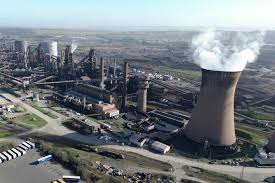UK lays groundwork for nationalisation of British Steel, recalls Parliament

London: Britain moved towards the nationalisation of British Steel after it recalled Parliament to introduce legislation that would keep the company’s blast furnaces open, a move aimed at preserving the country’s steel-making capability and saving jobs.
British Steel, owned by China’s Jingye Group, employs 3,500 people at its Scunthorpe plant and supports more in the supply chain.
It has warned it could shut its two blast furnaces, which are losing £700,000 (S$1.2 million) a day, as soon as June.
Its output is used in the national rail network as well as in the construction and automotive industries.
Without the Scunthorpe plant, Britain would be solely reliant on imports at a time of global trade wars and geopolitical instability.
“The Government has requested a recall of the House to take forward legislative proposals to ensure the continued operation of British Steel blast furnaces is safeguarded,” a note to lawmakers said.
The lower chamber of Parliament, the House of Commons, had been scheduled to be in recess for an Easter holiday until April 22.
Such recalls only tend to happen in extraordinary circumstances, such as in August 2021 when lawmakers were brought back to discuss the withdrawal of troops from Afghanistan.
British Steel has been hit by years of high energy prices and was further damaged by US tariffs of 25 per cent on all imports of steel, which took effect in March.
Asked about the company’s nationalisation, British finance minister Rachel Reeves told reporters earlier on April 11 that all options remained on the table to prevent the blast furnaces from closing.
“We recognise the importance both to Scunthorpe for the jobs and community there, but also for our national economy, to maintain the capacity to make steel in Britain,” Ms Reeves said.
A spokesperson for British Steel declined to comment.
The future of the Scunthorpe plant came to a head after the government and British Steel failed to agree a funding deal to switch to a greener type of steel production.
The government had already earmarked £2.5 billion for the steel industry and has said it would publish a strategy on its plans for the sector in spring 2025.
In the 19th century, Britain was the world’s biggest steel producer, but its industry has been in decline, hurt in recent decades by a glut of low-cost production globally and high energy costs for domestic production.
More recently, tariffs have sent shockwaves through the sector. Britain’s steel exports to the US are worth more than £400 million a year, according to industry body UK Steel, or about 5 per cent of total steel exports.
The nationalisation of British Steel would be the biggest state rescue since a number of banks were taken into government hands in 2008.
Less carbon-intensive electric arc furnaces, which make new steel from scrap, are being built in Britain at Tata Steel’s Port Talbot site, following a government support package worth £500 million.
The two blast furnaces at Port Talbot closed in 2024, and the new electric furnace will not start producing steel until late 2027 or early 2028.





